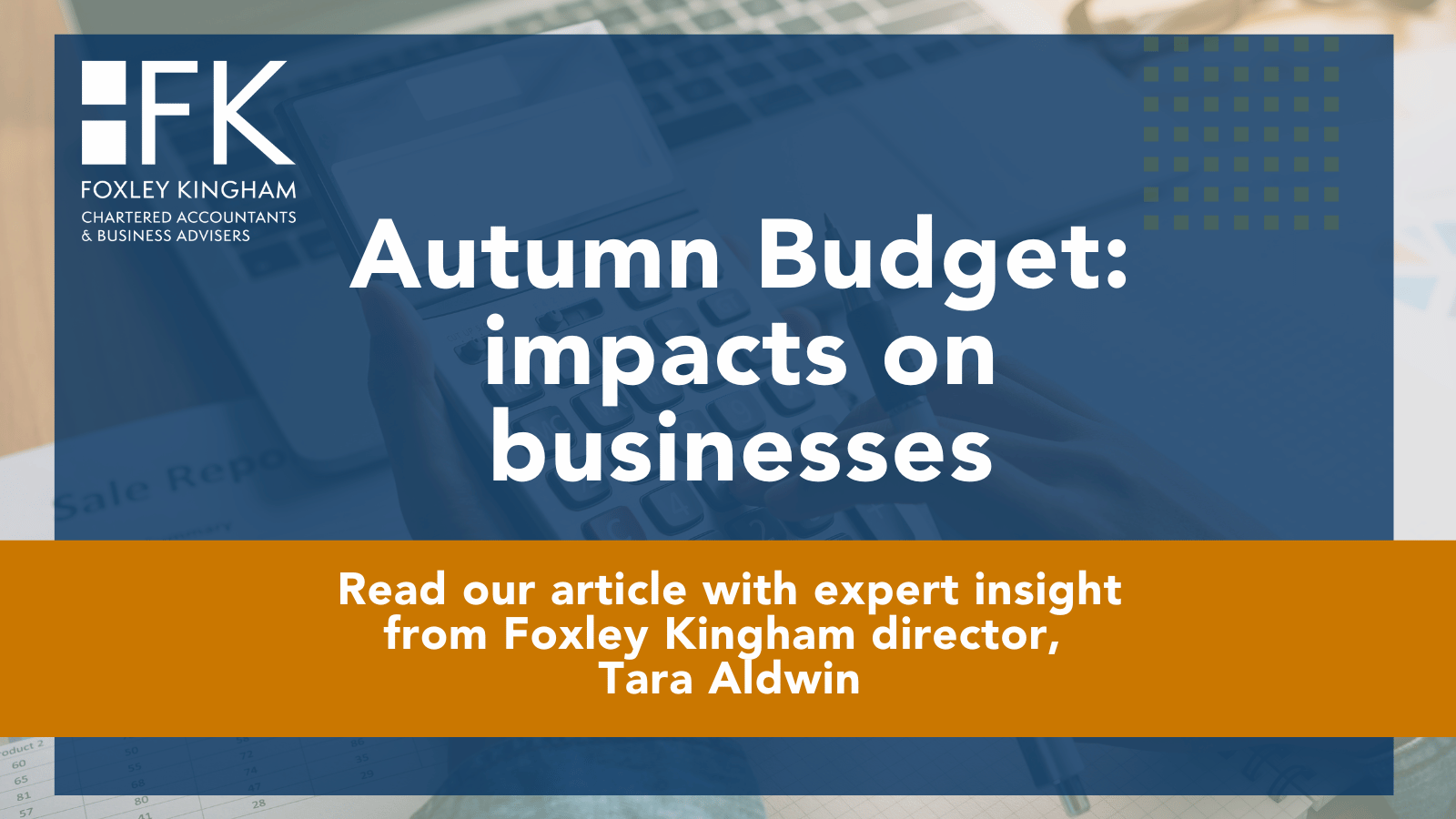
The Chancellor’s Autumn Budget has been much anticipated. Against a challenging economic landscape and increased cost of living – businesses and individuals alike were concerned what this budget may bring. But that’s perhaps where the common ground ends. Before the Budget was announced, messaging was clear that individuals would likely benefit, and businesses would have to foot the bill. So, exactly what has transpired, now the details have been announced? Here’s everything we know and what it means for you.
Key headlines from the Autumn Budget 2024
- Across the board, tax increases will raise £40bn for the public purse.
- Employers’ National Insurance Contributions will rise to 15% from April 2025, and the threshold at which it becomes payable decreased from £9,100 to £5,000. Employment Allowance will increase from £5,000 to £10,500.
- The freeze on income tax and national insurance contributions for individuals will not be extended beyond 2028.
- From 30 October 2024, Capital Gains Tax lower rate will increase from 10% to 18% and the higher rate from 20% to 24%. Capital Gains Tax on residential property is to remain unchanged.
- From April, the National Minimum Wage will rise to £10 for those between 18 and 20, and the National Living Wage for those ages 21+ will rise to £12.21. Apprentices will see their hourly pay rise to £7.55. A comparatively massive jump.
- Inheritance Tax threshold to be frozen until 2030.
Changes affecting businesses…
The Autumn Budget is a mixed bag for business – but it’s not quite the horror show that was drip-fed to the media in the weeks leading up to the announcement. In this case, the detail around headline announcements gives a clearer picture of what the impact will be. Some industries and businesses will find small giveaways amongst the finer print but there is no doubt that the effect of the Chancellor’s changes will mean more financial burden for businesses. Here’s the main points to be aware of.
Employers’ National Insurance Contributions
This is the big hitter. The one that is set to raise over 50% of the £40bn raised in taxes by this budget. And it’s also going to hit businesses by significantly increasing their employment costs.
From April 2025, businesses will now pay a national insurance rate of 15% up from 13.8%. And the threshold at which this rate is paid will fall from £9,100 to £5,000. Helpfully to small enterprises, the Employment Allowance will increase from £5,000 to £10,500 – which will minimise the impact on those with a smaller workforce and wage bill.
National Minimum and Living Wage Increases
Adding to the increase in employment costs are sizeable increases to both the National Living Wage, National Minimum Wage, and Apprenticeship Wage. Whilst this is progressive and good for individuals, it’s included alongside a number of other measures which will tangibly impose more costs on businesses.
Businesses will need to give due consideration to the increases to NI and wages – the changes are set to come about in April 2025 and that’s not far away.
Main rate of Corporation Tax frozen at 25%
The main rate of Corporation Tax that is paid by businesses on profits of £250,000 and above, is to remain frozen until the next election. This will go some way to giving incorporated businesses a degree of certainty, at least for the next few years.
In a similar vein, The Chancellor also released an accompanying Corporate Tax Roadmap which will give more details on Labour’s plans for corporate tax, for the duration of their term in Government. This is good news – as at least that will provide some degree of certainty for the future which will allow businesses to plan and forecast accordingly.
Additional relief for businesses in the hospitality, retail, and leisure sectors
For businesses in the hospitality, retail, and leisure sectors continued relief to business rates will be given at 40%, capped at £110,000 per business – a reduction from the 75% that has been in place for the last few years. Whilst this is still helpful, many were hoping the relief would be continued at the existing rate.
The reduction in the relief alongside increased employment costs will mean a larger burden on businesses – start planning now for what this means for your bottom line.
In another move which reversed a recent Tory U-turn, the treatment of double cab pick-ups with a gross payload of over 1 tonne will be treated as cars rather than vans for the purposes of benefits in kind and capital allowances from April 2025. This will be a disappointment to many but transitional arrangements will apply until then, so there is time to implement some planning. The VAT rules are unaffected and input tax can still be recovered.
Tara Aldwin, Director at Foxley Kingham commented:
“In many ways, we can breathe a sigh of relief now that The Autumn Budget has been announced. The rises we were dreading to see have happened, but they’re not quite as substantial as we thought they might be. The lowering of the threshold on which Employers NICs are applied was a surprise addition but the increase in employment allowance goes some way to protecting the smallest businesses who might not have the cash reserves to fund the otherwise sizeable hikes.
I think this Autumn Budget has really set the tone of what to expect from this Government. With that knowledge and the release of a new Corporate Tax Roadmap – it is sensible that businesses read up on the finer detail of the Budget, forecast, evaluate, and plan accordingly.”
Changes affecting individuals…
Similarly to the changes that affect businesses, we expected most of what’s been announced for individuals. Good news comes in the form of an increase to the National Minimum and Living wages and Labour stuck to their election manifesto pledge not to raise income tax and National Insurance contributions.
Whilst there has been an increase in Capital Gains Tax, it’s lower than expected and the beneficial Business Asset Disposal Relief has been retained. Changes to the reliefs around Inheritance Tax are worth being aware of, for business owners, farmers and pension holders.
Income Tax and National Insurance Contributions frozen
The Autumn Budget confirmed that the current rates of income tax and National Insurance, paid by employees, will remain unchanged. We’ve also been given a bit of extra info, in that income tax bands won’t increase until after 2028, when they’ll be raised in line with inflation.
Capital Gains Tax Increased
We all expected it – mainly because this was a change trailed by the government in advance of the Budget’s announcement in full. The lower rate of Capital Gains Tax will rise from 10% to 18%, while the higher rate will also rise from 20% to 24%. Importantly, Capital Gains Tax on residential property will remain unchanged.
Alongside these changes, the Chancellor also announced that the lifetime limit for Business Asset Disposal Relief would be maintained at £1m, “to encourage entrepreneurs to invest in their businesses”. But she also announced that whilst the rate of relief will remain at 10% this year, it will rise to 14% in April 2025, and to 18% in the 2025/26 financial year.
This is especially important for business owners who are approaching retirement, or thinking of selling or exiting their business. If the time is imminent, you may want to consider the impact of increased rates coming over the next three years and perhaps beyond.
Changes around Inheritance Tax
It’s the biggy that many of us were waiting for – we all know that Inheritance Tax, however unpopular, has often been a target for Labour governments. And whilst the news wasn’t as bad as we’d feared, the devil is in the detail.
The Inheritance Tax Threshold will remain frozen until 2030, as will the Residential Nil Rate Band. But there are changes that could make a meaningful difference to those who qualify.
From April 2027, any money inherited from unused pension pots will also be included in the value of a person’s estate, and therefore liable for Inheritance Tax. This is a significant change in the system and has been introduced to tackle the misuse of pensions to transfer wealth, without paying IHT.
Specifically affecting owners of family-run businesses and farms, the Chancellor announced that from April 2026, the government will begin to reform both the Business Relief and Agricultural Property Relief. For those with assets valued up to £1m, nothing will change and 100% relief applies. But thereafter, relief will only be applied at 50%, meaning there is an effective IHT rate of 20% for business/agricultural assets over £1m. If you’re affected by the above changes, it’s time to revisit your estate and plan with the support of your Accountant.
Changes to Stamp Duty
Housing has been headlined as a priority for this Government. And as such, the Budget stated that the existing raised threshold of £425,000 for first-time buyers will stand until April 2025. After that, it will be lowered to £300,000, meaning first-time buyers will pay Stamp Duty of 5% for the value of the property between £300,001 and £600,000.
For those selling their own home and moving to a new one, 5% Stamp Duty is due on the value of your property between £250,001 and £925,000. Beyond that 10% is due up to £1.5m, and 12% due on everything over and above that. From April 2025 the lower threshold reverts to £125,000, and 2% is payable between £125,001 and £250,000.
The biggest change to the Stamp Duty regime came for those purchasing a second property. The additional Stamp Duty for second homes has been raised from 3% to 5% – effective immediately – which will be a sore one for anyone making an impending purchase. Unlike with your primary residence, this amount is due on the entire value of the property, which will mean a heftier bill for those with rolling property portfolios.
The single rate of SDLT payable by companies acquiring dwellings for more than £500,000 also increases by 2% from 15% to 17%.
Whilst it’s not disastrous news for homeowners, those dealing in holiday rentals and long-term lets of properties have seen changes in the last few years which haven’t been great for business. Between increased stamp duty and Capital Gains Tax, it’s important to understand exactly what this means for your business.
Tara continued:
“There’s no doubt that whilst the Autumn Budget will benefit a number of employed individuals, there’s quite a lot in here that will affect a variety of businesses – and business owners.
Whilst it feels like the Government has tried to be balanced, it’s clear there’s money to be clawed back and the onus is being put on businesses to foot that bill. There are a lot of nuances in the detail with this Budget which means we expect many business owners will want to have a detailed discussion with their Accountant around the impact it might have on them.
On a more positive note, the Government is also providing guidance for the future which will help businesses to plan accordingly for the change in the fiscal regime.
With new found clarity of the Government’s approach to the economy, it’s now time to get your ducks in a row. And that starts with a conversation. We urge anyone who’s unsure of the impact to get in touch for a confidential conversation.”
Read the full Autumn budget report here.
Your Foxley Kingham account manager can help if any of the announced changes raise queries or give you reason for concern. If you’re not an existing client of Foxley Kingham, we also offer free initial consultations. To initiate either of the above, get in touch here.

